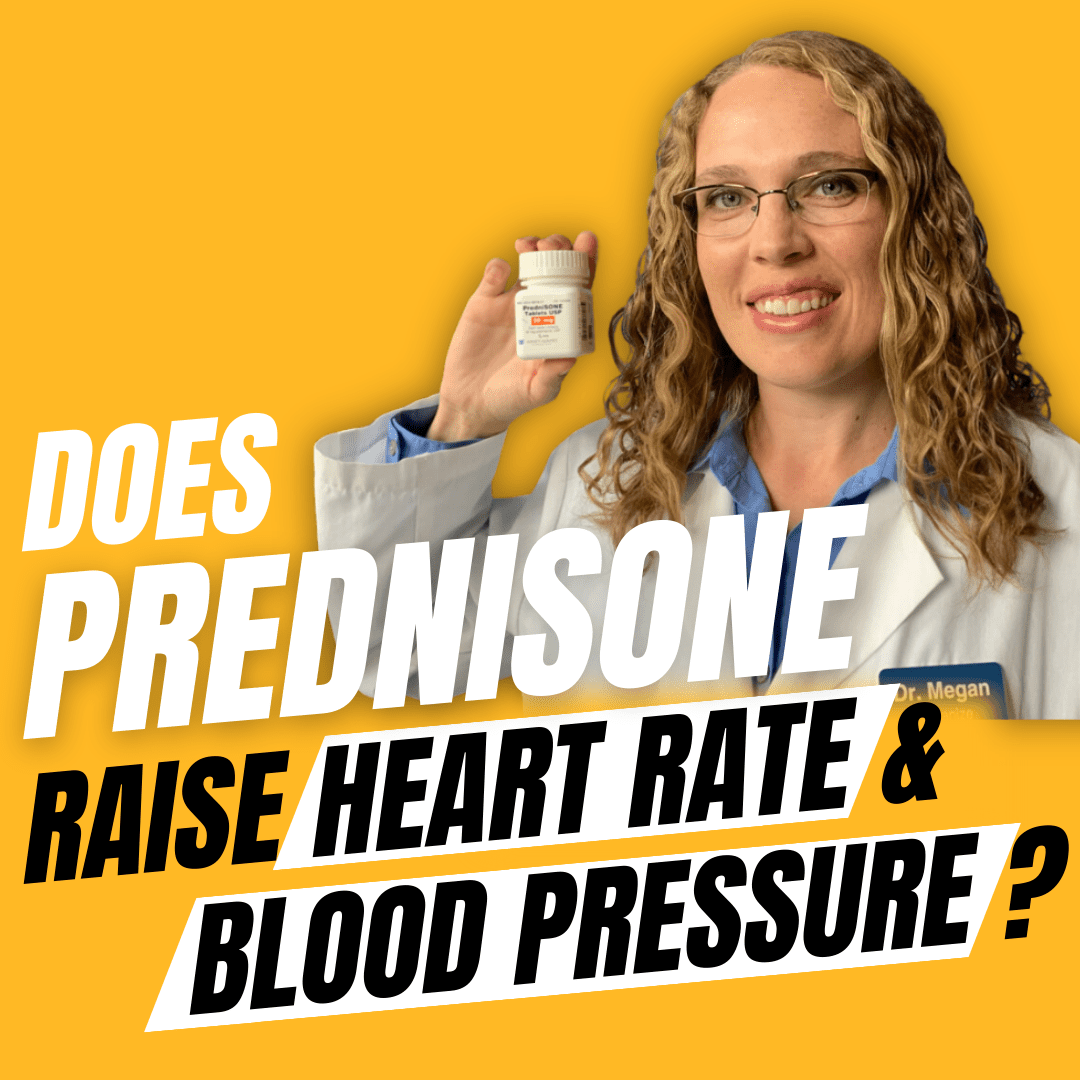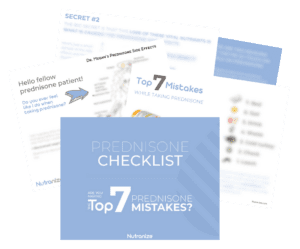Does Prednisone Raise Your Heart Rate and Blood Pressure?

Does Prednisone Raise Your Heart Rate and Blood Pressure?
Yes, prednisone does raise your heart rate and blood pressure. However, there’s more to it than the simple “yes” answer. Read on or watch this video to understand what you can do about it.
Watch now!
Prednisone Affecting Heart Rate and Blood Pressure?
Prednisone, a widely prescribed corticosteroid medication, is known for its potent anti-inflammatory properties. While it can be highly effective in treating various medical conditions, concerns about its potential impact on heart rate and blood pressure have emerged. In this blog post, I will shed light on whether or not prednisone raises heart rate and blood pressure, providing you with a comprehensive overview of the existing evidence.
Dr. Megan’s Experience with Prednisone Causing Palpitations and Tremors
When I first took prednisone, it made me feel like I was suddenly old.
Even though I was in my early thirties, many of the side effects felt like what I’d observed in older people.
Getting hot flashes made no sense to me at my younger age.
But the hand tremors and heart beating so hard it felt like it was trying to escape my chest were worse.
It reminded me of my grandfather’s hand tremors from old age. 👋
I was too young for that!
The heart beat changes made me worried I was getting heart disease or something worse.
Plus I had high blood pressure for the first (and only) time in my life.

So in this video and blog post I’d like to share what you need to know about prednisone and heart rate, blood pressure, and palpitations.
You’ll discover which heart side effects are permanent, and which are reversible.
Plus what you can do about them!
What is Prednisone?
Prednisone is a synthetic hormone that resembles cortisol, a naturally occurring hormone in our body. Doctors often prescribe it to manage conditions such as allergies, autoimmune diseases, asthma, and certain types of cancer. This drug works by suppressing the immune system and reducing inflammation, thereby alleviating symptoms and promoting healing.
Does Prednisone Raise Your Heart Rate?
One common concern associated with prednisone usage is its potential impact on heart rate. Some individuals may experience an increase in heart rate while taking this medication. However, it is essential to note that the extent of this increase varies among individuals and depends on various factors such as pre-existing heart conditions and dosage.
Research suggests that the elevated heart rate observed in some patients on prednisone may be due to the drug’s stimulatory effect on the sympathetic nervous system. This system controls the “fight or flight” response in the body, with increased activity leading to an elevated heart rate. However, it is important to remember that not everyone experiences this side effect, and for many, the increase in heart rate is minimal and does not pose significant health risks.
Can the Increased Heart Rate Cause Palpitations, Tremors or Arrhythmias?
Prednisone causes an electrolyte imbalance by retaining sodium and excreting potassium, leading to increased heart rate and heart rhythm changes and potentially fatal arrhythmias (which are very rare). The palpitations and hand tremors from prednisone are common and usually nothing to worry about, but if you’re worried about it, let your doctor know.
Can Prednisone Cause High Blood Pressure?
Another concern often raised is whether prednisone raises blood pressure. Similar to heart rate, prednisone’s impact on blood pressure is variable, and not everyone will experience an increase. Nevertheless, research suggests that certain individuals, particularly those already at risk of hypertension, may be more susceptible to elevated blood pressure while taking prednisone.
The medication’s mechanism of action involves promoting sodium and water retention, which can lead to an increase in blood volume and subsequently raise blood pressure. Additionally, prednisone can impair the function of blood vessels, making them less flexible and contributing to higher blood pressure. It is crucial to communicate any pre-existing cardiovascular conditions to your healthcare provider when considering prednisone therapy.
Can Prednisone Increase Heart Rate Permanently?
While prednisone can have negative effects on heart rate and blood pressure, these effects are not permanent. Prednisone also causes water retention, resulting in higher blood volume and increased blood pressure. These effects are reversible at lower doses and once off prednisone completely. Any damage caused by the high blood pressure or heart rate is not reversible, however.
How Can I Stop Heart Palpitations, High Heart Rate, and High Blood Pressure?
If you are concerned about the potential impact of prednisone on heart rate or blood pressure, it is important to seek guidance from your healthcare provider. They can help monitor these vital signs regularly, assess any risks, and make informed decisions about your treatment plan. In some cases, your doctor may recommend lifestyle modifications, such as dietary changes, regular exercise, or medications, to counteract any adverse effects. Deep breathing and meditation can lower your heart rate and blood pressure as well.
Conclusion:
Prednisone is a powerful medication that offers significant benefits in managing various medical conditions. While it can potentially affect heart rate and blood pressure, these side effects are not experienced by everyone. It is crucial to maintain open communication with your healthcare provider throughout your treatment to monitor any changes and address concerns promptly. By working together, you can ensure that the benefits of prednisone outweigh any potential risks, promoting your overall health and well-being.
If you’d like help with side effects like these or the other top 15 side effects of prednisone, download my FREE Prednisone Checklist:
Related Posts
-
How I Ended Up on Prednisone – My ITP Story
My Prednisone Warrior Story Hello! I am Megan, a 30-something year old pharmacist and mother... -
Prednisone Side Effects – The Ultimate List
Prednisone Side Effects List Which prednisone side effects did your doctor or pharmacist warn you... -
“A Change of Heart” ♥ – Prednisone for Heart Transplant
She almost died while training for a triathlon 20 years ago and now, after her... -
Learn About the Adverse Effects of Prednisone
Adverse effects, also known as side effects, are the negative consequences of taking a drug.... -
How I Coped with Prednisone
Prednisone saves lives. It certainly saved mine! Prednisone is miraculous but having those side effects...

